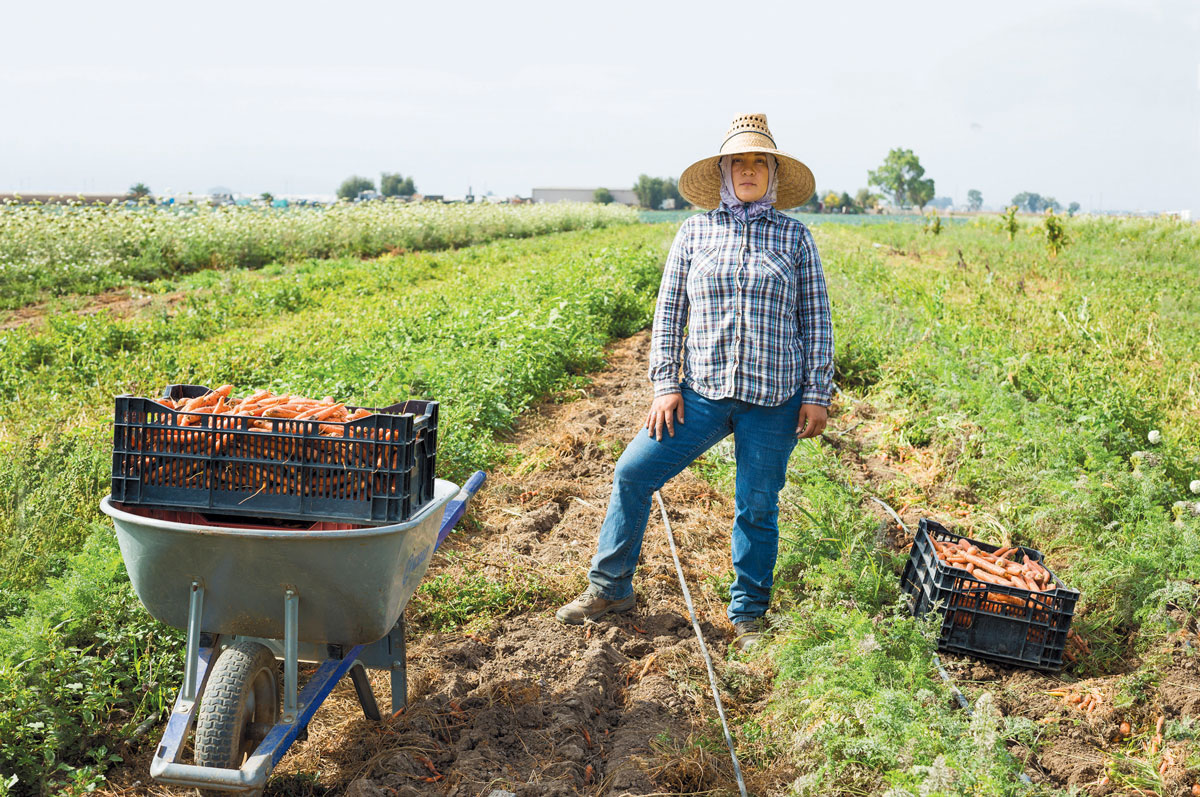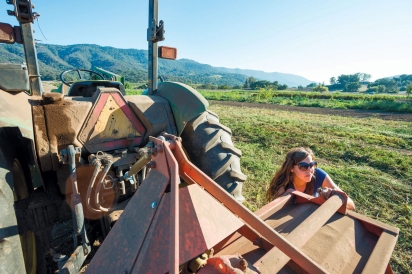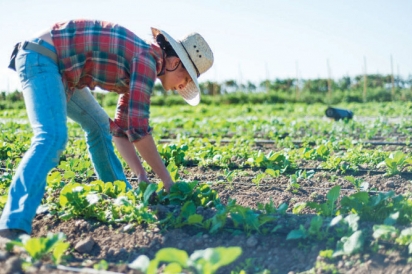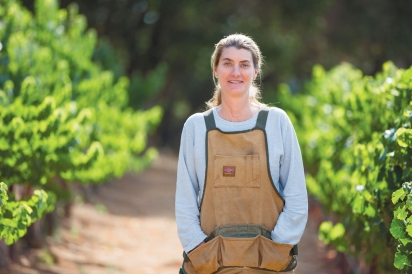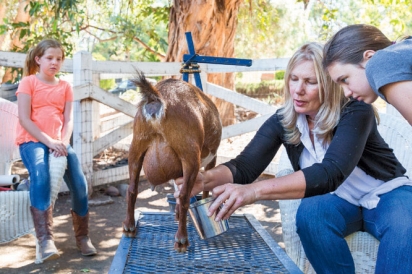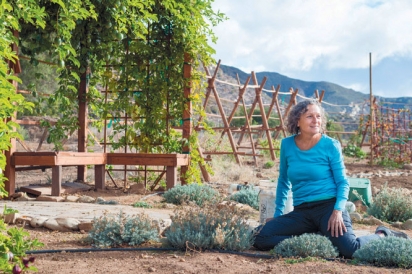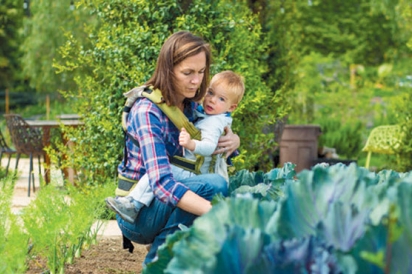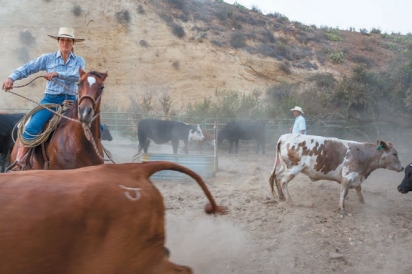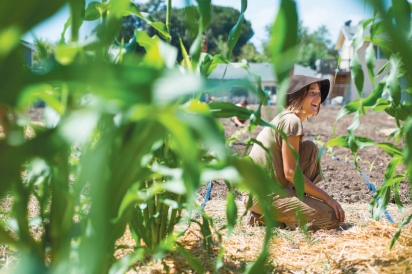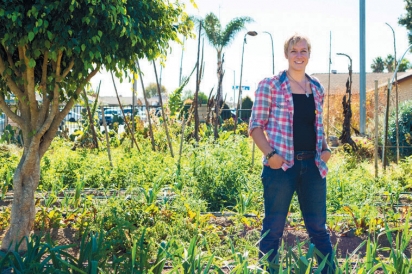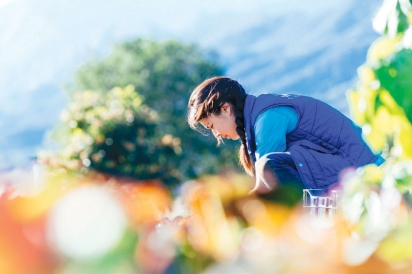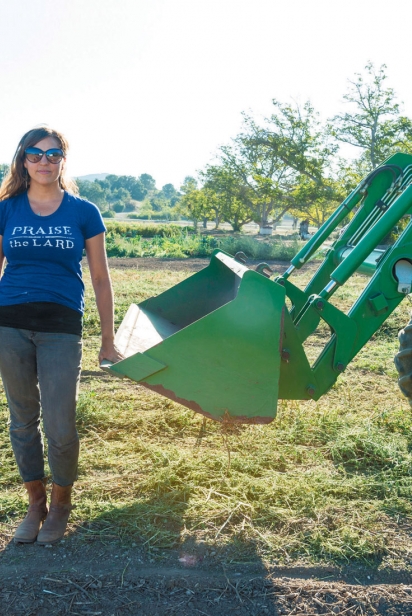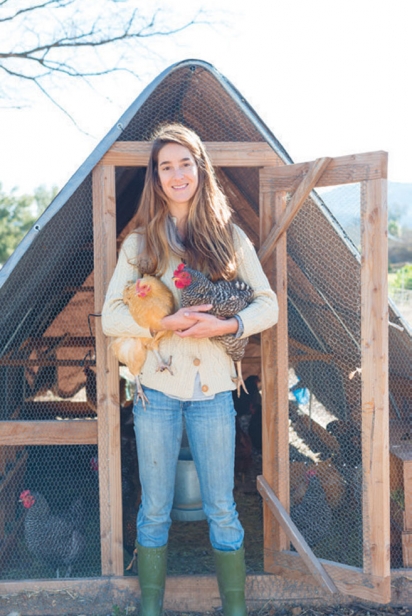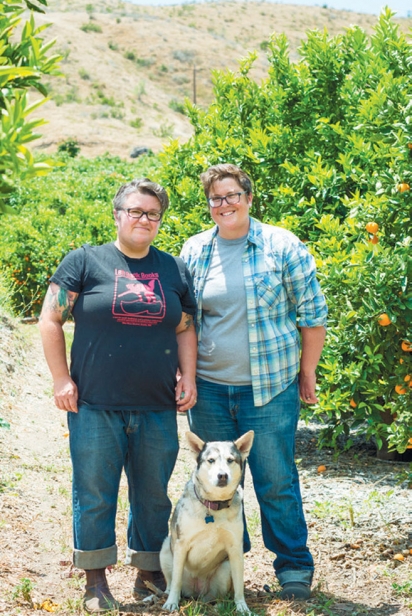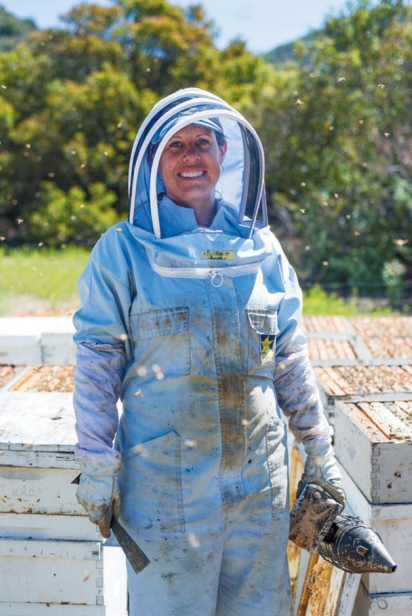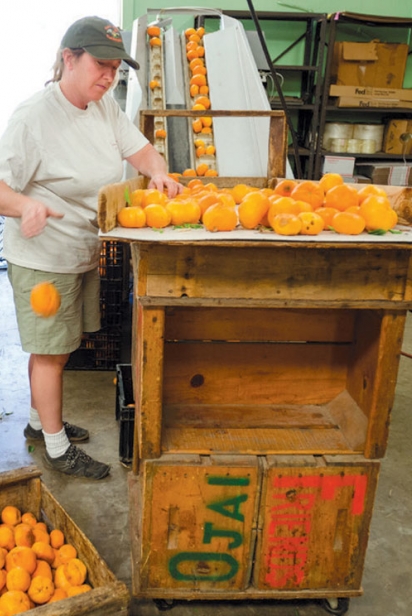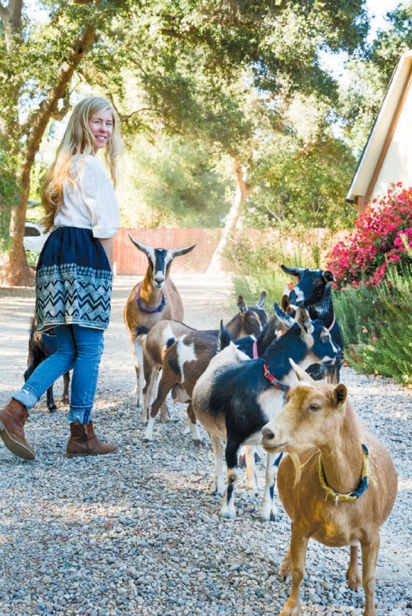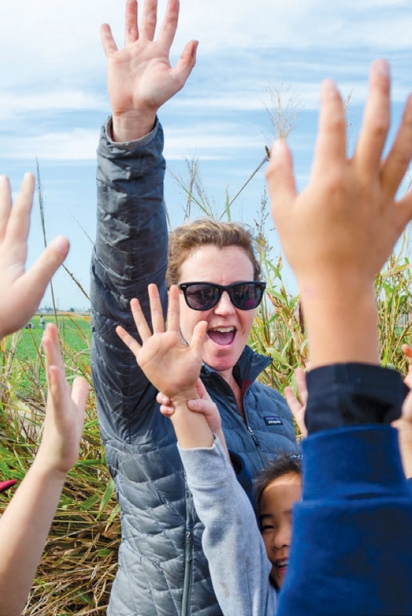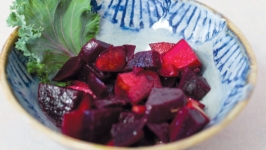Soil Sisters
Meet the “Soil Sisters”
Keri Oberly’s photography exhibition that featured the women here was on display at the Ventura County Agriculture Museum in Santa Paula.
Ventura County’s bumper crop of women farmers is growing
Dressed in jeans, straw hat and long-sleeved plaid shirt, her face covered in a bandana and wrap-around sunglasses, Reyna Ortega, 31, looks like a field warrior in the midday sun. As production manager for The Abundant Table, a faith-based farm project leasing five acres from Camarillo’s McGrath Family Farm, Ortega is devoting her week and five extra workers to hand-weeding their rows of organic Romaine, curly leaf lettuces, carrots and strawberries. There are far more weeds on an organic farm than a conventional one, she says through an interpreter, and right now theirs are “getting out of control.”
When asked about her gold nail enamel, she proudly holds out her bare hands caked in gray earth. She doesn’t usually paint them, the mother of four daughters says shyly, but last night her oldest daughter insisted on doing them for her.
Ortega is one of a growing number of women pursuing a calling in agriculture. Women are said to now comprise 30% of farm operators in the U.S., a number that has tripled over the last three decades, making it the fastest growing segment in agriculture. In 2012, the latest available statistics for Ventura County, nearly 20% of the county’s farm owners were women, landing Ventura in the top 10 in California for women-owned farms.
Ortega doesn’t own her land, but has found a good life working it. Agriculture was one of her few options when she arrived in Oxnard, alone at the age of 14, from her native Mexico City. Facing a future of poverty, drugs, violence and potential prostitution there, she says, “I saw the U.S. as a place to save my life.” In Oxnard she rented a room from a distant relative and found work in a celery field.
“At first it was an adventure, but then I discovered the harsh reality of immigrant life. Work was much more physical here.”
It was also more challenging for females. “As a woman, I saw we had lesser value than men. It was a very macho atmosphere.” She witnessed sexual harassment, from men commenting on female workers’ appearance to managers demanding sexual favors. “They took advantage of their power,” Ortega says.
Ortega has worked for The Abundant Table, a small sustainable nonprofit farm currently located in Camarillo, since 2012 and has been production manager for the past year. The farm supplies a 100-member community-supported agriculture (CSA) program, sells organic vegetables wholesale to Ventura Unified, El Rio and Santa Paula school districts, and works closely with Port Hueneme School District doing pop-up farm stands for the families.
The nonprofit’s commitment to a living wage and health benefits affords Ortega and her husband, Guadalupe Rojas Angel, her only other full-time employee, a decent family life. Their daughters attend schools that The Abundant Table supplies and Ortega may soon be providing the salad and flowers for her 14-year-old’s quinceañera.
Ortega has also become active with community organizations fighting for farmworker rights. Would she want her daughters to go into farming? Without hesitation, she says: “Yes.”
Elizabeth Del Negro’s hands are brown with earth and tan from the sun, working Ojai’s Rio Gozo Farm in partnership with her husband, John Fonteyn. The Ojai native came to farming after college at UC Santa Cruz and a decade living “the life of an adventurer,” Spanish teacher and outdoor educator.
The 41-year-old considers food and farming a legacy of her Italian heritage and “part of my DNA.” Growing up, her family always had chickens, corn, tomatoes and fruit trees growing in the yard. Her father was a professional chef at Ojai’s Ranch House and The Oaks at Ojai, while her UC Berkeley—educated mother cooked, kept house, raised three children and taught high school. “I consider her a major role model for the hardworking, educated woman who both earned money and cared for a home.”
After a life of adventure climbing mountains in Peru, volcanoes in New Zealand and teaching for Outward Bound, Del Negro returned to Ojai at age 33 ready for a “less nomadic life,” she says. “There’s nothing less nomadic than farming!”
She began to date and fall in love with Fonteyn, an organic farmer. “He let me drive his tractor,” she recalls. “I looked up at the mountains and I remember thinking ‘Yeah, I could trade my backpack for this.’” They started farming together, launched a CSA program and soon married. Del Negro is stepmother to Fonteyn’s 13-year-old son. After seven years in the fields, she says she’s found a significant connection between farming and outdoors adventure: “They both take an indomitable spirit.”
With the part-time help of employee Lyz Merola, Rio Gozo has eight acres in production, three at their recently purchased Ojai house (“an incredible feat to do on a farmers’ income”) and five acres rented at Ojai’s Besant Hill School.
When we talked in July, it was the “height of the season” for their squash blossoms, tomatoes, basil, melons, onions, summer and winter squash and “lovely” lettuce mix, “our soil grows lettuce really well.” They’ve reduced their CSA program to some 25 members to focus on supplying local farm-to-table restaurants. The list includes Ojai’s Azu Restaurant & Bar, Tipple & Ramble, Osteria Monte Grappa, Deer Lodge and Nocciola. In Ventura, they supply Patagonia, Main Course California, and Oxnard’s Tierra Sur at Herzog Wine Cellars, as well as Ojai Valley Community Hospital and Besant Hill School.
When asked about challenges she’s faced as a woman in agriculture, Del Negro cites her humiliation at early farm-to-table dinners. The evening’s emcee invariably named Fonteyn when thanking farmers for all their hard work, but not Del Negro. “We were 50-50 partners,” she recalls. “It was just devastating not being publicly recognized for the same hard work.” She started talking with the emcees. “I’d joke that I ruined my career as a hand model for this and I deserved some credit.”
Now she’s named, as well.
Running Rio Gozo, she’s personally experienced the rise in women’s interest in farming. “All the volunteers who come to work here are women,” she says, ditto queries from college graduates investigating agricultural careers. When asked, they say it’s because they’re passionate about ag, growing food and they like being outside. The nurturing aspect of tending the plants, a trait we tend to associate with women, may also be a factor—but Del Negro is quick to point out it’s a good trait for any farmer to have.
One thing she has noticed is that when women commit to farming, it’s for the long haul. They understand that growing crops—like raising children—takes years of care and attention.
“The better workers, in my experience, have been the girls,” she says. “They’re precise, detail-oriented, careful workers, hard workers. I would say our experience is that the girls we have worked with were very well-suited to farming. There is something to how they make a bunch of kale look good,” she adds, then she stops herself from waxing too poetic. “John can make a pretty bunch of food. There’s a sensitive, feminine quality to him.”
Pretty veggie bouquets aside, some people seek out wine made by women because, legend has it, women’s more sensitive sense of smell is an advantage in many aspects of winemaking. “I heard that in school,” says Anne Cuthbert, winemaker for her family’s Noble Oaks Vineyard & Winery of Ojai. “I don’t really think there’s a difference based on gender in terms of winemaking. I seek out [wine made by women] because it’s exciting to discover a woman doing something I’m doing.”
Cuthbert, 45, came to her “dream job” making wine from a successful career in business, holding a master’s degree in industrial administration from Pittsburgh’s Carnegie Mellon University and having served as CFO for a number of companies.
The shift to agriculture began for her in 1999 when her parents bought six acres with a 1928 Spanish-style home in Ojai. Her parents decided it would be nice to have a vineyard view from the house. Her father planted an acre of Malbec and Tannat vines, from which they currently produce less than 1,000 cases annually.
“It’s a hobby that got out of control,” Cuthbert says.
It’s a small but well-regarded output. Their 2005 Cabernet Franc won best of festival in Santa Barbara’s 2008 Franc Fest. The label can be found in Ojai at the Ojai Valley Inn & Spa, Ojai Beverage Company, Attitude Adjustment Shoppe, Osteria Monte Grappa and Boccali’s Pizza and Pasta, as well as on Island Packers cruises to the Channel Islands.
Cuthbert, who married husband, Damon Brink, at the winery in 2007 and is now the mother of two children, enjoys working outdoors pruning her own vines and harvesting the grapes, and says she hasn’t had any problems with male farmworkers. “They’re all professionals,” she says. Plus, at 5—feet-11, she adds, “I’m taller than most women and I can look men squarely in the eye, which puts us on level ground.”
If anything, it’s easier being a woman in winemaking in 2016. “There aren’t many women doing it. So it’s still a novelty.” The only real barrier she’s encountered is “having the necessary physical strength” for heavy lifting. She still struggles with a wine barrel that weighs 100 pounds empty.
Brink, a materials scientist, is happy to let his wife do the more mundane winery tasks. “He gets excited about the harvest part,” she says, “pressing the grapes, bottling the wine. He doesn’t volunteer to prune the vines.”
Whether women rise up from itinerant fieldwork to the rank of farm manager or leave the boardroom to tote wine barrels, farming has become a place for women to not only get their hands dirty, but also find fulfillment.
“Women fought to be in the workplace,” Del Negro says. “And my generation benefitted from that. Now it’s all so gender neutral, it’s not really much of a thing anymore.”
Michael Roberts, an organic farm consultant who works with Ortega (“We talk out in the fields about spiritual concerns and life”) thinks that the growing crop of “Farmer Janes” is a good thing. “You need the balance. We need more women in agriculture. There’s a huge place for them in farming and nurturing the land.”
If Ortega’s daughters do follow her into the fields for their life’s work, they might find some of the same strength there she has found.
“I feel powerful knowing that my work has an impact on the Earth and consumers’ health,” she says. “It makes me feel good to know. Even though the produce is too expensive for farm workers to buy, we sell to the schools where their children go.”
Clearly, women farmers are changing the face of agriculture while working for change one row at a time.
Why Do Women Farm?
Ventura County has a history of extremely influential women farmers who have not only tended the farm, they’ve been active in farm policy, workers’ rights and other humanitarian and agriculture-related issues. We honor these groundbreakers and applaud the women who are now getting into farming.
We wondered what’s inspiring this new crop of women farmers, so we reached out to Carolyn E. Sachs, PhD, co-author of The Rise of Women Farmers and Sustainable Agriculture (University of Iowa Press, 2016), to find out.
Here are Sachs’s five reasons why:
• Sustainable and organic farming opened opportunities for women.
• Increase in women’s equality.
• Increase in women-owned businesses.
• Women’s concern for the environment in all areas.
• Women are closer to the table—they feed people and understand the importance of good food.
THROUGH MY LENS: What became the “Soil Sisters” photography exhibition started out as a project documenting women working in fields traditionally dominated by males. It quickly turned into a photography project on female farmers. With the large number of women in agriculture in Ventura County, there was no shortage of referrals.
I quickly realized these women were not just defying odds in the field, but doing so in life as well—from being saved from a life on the streets, to taking over a family business, to leaving steady jobs.
They don’t treat farming as a job; it is their way of life. They are passionate, strong and artistic women who are dedicated to health and education, as well as building and inspiring a community that will last generations.--Keri Oberly


